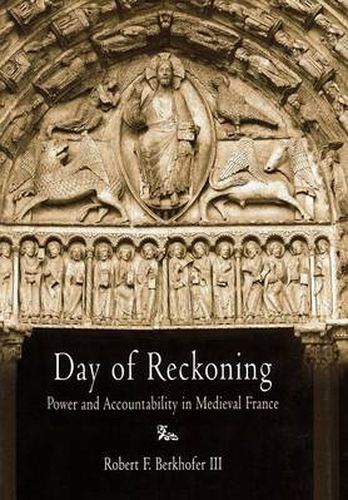Readings Newsletter
Become a Readings Member to make your shopping experience even easier.
Sign in or sign up for free!
You’re not far away from qualifying for FREE standard shipping within Australia
You’ve qualified for FREE standard shipping within Australia
The cart is loading…






This title is printed to order. This book may have been self-published. If so, we cannot guarantee the quality of the content. In the main most books will have gone through the editing process however some may not. We therefore suggest that you be aware of this before ordering this book. If in doubt check either the author or publisher’s details as we are unable to accept any returns unless they are faulty. Please contact us if you have any questions.
Day of Reckoning: Power and Accountability in Medieval France applies recent approaches to literacy, legal studies, memory, ritual, and the manorial economy to reexamine the transformation of medieval power. Highlighting the relationship of archives and power, it draws on the rich documentary sources of five of the largest Benedictine monasteries in northern France and Flanders, with comparisons to others, over a period of nearly four centuries.
The book opens up new perspectives on important problems of power, in particular the idea and practice of accountability. In a violent society, medieval lords tried to delegate power rather than share it-to get their men to prosecute justice or raise money legitimately, rather than through extortion and pillage. Robert F. Berkhofer III explains how subordinates were held accountable by abbots administering the extensive holdings of Saint-Bertin, Saint-Denis, Saint-Germain-des-Pres, Saint-Pere-de-Chartres, and Saint-Vaast-d'Arras. As the abbots began to discipline their agents and monitor their conduct, the day of reckoning took on new meaning, as customary meeting days were used to hold agents accountable. By 1200, written and unwritten techniques of rule developed in the monasteries had moved into the secular world; in these practices lay the origins of administration, bureaucratic power, and governance, all hallmarks of the modern state.
$9.00 standard shipping within Australia
FREE standard shipping within Australia for orders over $100.00
Express & International shipping calculated at checkout
This title is printed to order. This book may have been self-published. If so, we cannot guarantee the quality of the content. In the main most books will have gone through the editing process however some may not. We therefore suggest that you be aware of this before ordering this book. If in doubt check either the author or publisher’s details as we are unable to accept any returns unless they are faulty. Please contact us if you have any questions.
Day of Reckoning: Power and Accountability in Medieval France applies recent approaches to literacy, legal studies, memory, ritual, and the manorial economy to reexamine the transformation of medieval power. Highlighting the relationship of archives and power, it draws on the rich documentary sources of five of the largest Benedictine monasteries in northern France and Flanders, with comparisons to others, over a period of nearly four centuries.
The book opens up new perspectives on important problems of power, in particular the idea and practice of accountability. In a violent society, medieval lords tried to delegate power rather than share it-to get their men to prosecute justice or raise money legitimately, rather than through extortion and pillage. Robert F. Berkhofer III explains how subordinates were held accountable by abbots administering the extensive holdings of Saint-Bertin, Saint-Denis, Saint-Germain-des-Pres, Saint-Pere-de-Chartres, and Saint-Vaast-d'Arras. As the abbots began to discipline their agents and monitor their conduct, the day of reckoning took on new meaning, as customary meeting days were used to hold agents accountable. By 1200, written and unwritten techniques of rule developed in the monasteries had moved into the secular world; in these practices lay the origins of administration, bureaucratic power, and governance, all hallmarks of the modern state.